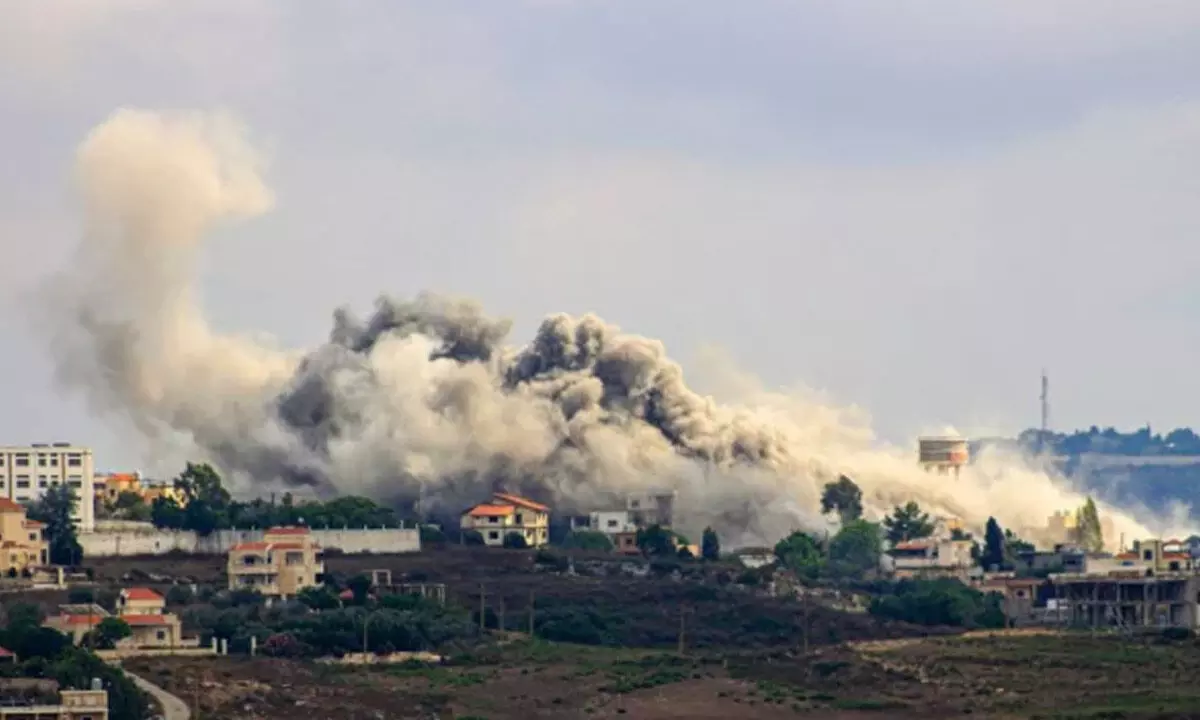Can Israel, Hezbollah be pulled back from the brink of war?

The Middle East is on the brink of a possibly devastating regional war, with hostilities between Israel and Hezbollah reaching an extremely dangerous level.
The Middle East is on the brink of a possibly devastating regional war, with hostilities between Israel and Hezbollah reaching an extremely dangerous level. Washington has engaged in intense diplomacy to persuade the protagonists to pull back from the brink. But US efforts have not paid off so far, given its lack of sufficient leverage with both sides. A grand bargain involving Israel, Hezbollah and their outside supporters is now urgently needed to avoid a regional war.
Hanging on by a thread Israeli Prime Minister Benjamin Netanyahu’s handling of the Gaza war has emboldened the Hezbollah militant group in Lebanon and its supporters. Israel’s failure to achieve its two main objectives in the war – destroying Hamas and rescuing the Israeli hostages – has left Netanyahu isolated and weakened. His pursuit of scorched-earth operations in Gaza, with no plan for how to end the war or to manage the enclave afterwards, has imperilled his position, as well as that of Israel.
A majority of the Israeli public now want him to leave office. He is hanging onto power with narrow support from the extremist elements in his cabinet and the Israeli Defence Force (IDF) leadership. He is even alienated from his traditional ultra-Orthodox Jewish supporters, who refuse to serve in the military, and is widely distrusted in Washington, Israel’s life-long backer.
Israeli generals have also expressed concerns about shortages of ammunition and troop exhaustion in Gaza. They have called for him to accept a ceasefire with Hamas, so Israel can confront Hezbollah effectively. But the Prime Minister has remained defiant and inaccurately accused the Biden administration of holding back arms supplies that could enable him to end the Gaza campaign sooner and pivot to taking on Hezbollah.
No doubt, Hezbollah has been a thorn in Israel’s side for a long time. In his address to the joint session of the US Congress on Wednesday, Netanyahu stressed that fighting Hezbollah and its patron, Iran, was in the interests of not only Israel, but also America. “80,000 of our citizens in northern Israel evacuated their homes, becoming effectively refugees in their own land. We are committed to returning them home. We prefer to achieve this diplomatically. But let me be clear: Israel will do whatever it must do to restore security to our northern border and return our people safely to their homes,” he said.
Israel has attempted several times to weaken or destroy Hezbollah since its emergence as a major political and paramilitary force in Lebanon from the early 1980s. Yet, Israel’s efforts, most notably its military campaign of 2006, have failed. Hezbollah’s ability to survive has added to its strength and that of Iran and its other affiliates, including Hamas, in the region. Hezbollah today is the most powerful, sub-national militant group in the world. It reportedly has 1,00,000 battle-hardened fighters, a vast arsenal of weapons (including advanced missiles and drones) and a remarkable degree of organisational strength and infrastructural support.
It is a critical element in the Iran-led, predominantly Shia “axis of resistance”, whose members consider martyrdom to be an article of faith. The newly elected Iranian president, Masoud Pezeshkian, who comes from the reformist faction of Iran’s politics, has reaffirmed Tehran’s unwavering support for Hezbollah against Israel as part of its regional security complex.
In the event of a war, Hezbollah can count on thousands of fighters joining it from Iran and its other proxies, as well as Islamic fighters from outside the region. The Taliban, for instance, has already promised to send many fighters from Afghanistan to aid Hezbollah. Although Israel, the US and many of their allies have treated Hezbollah as a terrorist organisation, the Arab League recently decided not to label the group as a terrorist outfit, in view of its growing popularity in the Arab and Muslim world.
A grand bargain
Israel is no longer regarded as the dominant power in the region. The Gaza war and its escalating military exchanges with Hezbollah, the Yemeni Houthis and Iran have revealed Israel’s vulnerabilities. It may still possess the necessary firepower to flatten Beirut in a similar manner to what it has inflicted on Gaza, but it would need direct US involvement to come out of a war with Hezbollah with any degree of resilience or wellbeing.
The US continues to stress its iron-clad commitment to Israel’s security, but supporting a war in Lebanon would be very difficult for the US, particularly with a pivotal election coming. This would likely trigger Russian, Chinese and North Korean support for Iran and, by extension, Hezbollah and other elements of the “axis of resistance”. In a grand bargain, Israel, Hezbollah and their outside backers would need to reach a diplomatic settlement to create mutually acceptable buffer security zones on both sides of the Israeli-Lebanese border. To achieve this, Israel and Hamas must first agree on a Gaza ceasefire and an exchange of hostages and prisoners as a foundation for a lasting settlement of the Palestinian issue.
Netanyahu has so far resisted this. He fears it would force him out of office and potentially land him in prison on pending charges of bribery and fraud. The history of the Middle East has repeatedly shown armed conflicts and outside interventions have never resulted in peace and stability. Instead, they have merely compounded the region’s problems. The Middle East situation is explosive, and level heads must prevail to prevent further inflammation.
(https://theconversation.com/)














